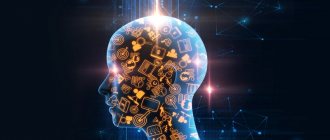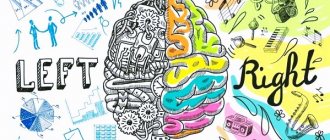What intelligence is and how its presence affects the successful realization of personality is an interesting topic for psychologists and people seeking to develop personal knowledge. How to become an intellectual and whether the human brain has a framework that gives clear signals about a sufficient level of knowledge and acquired experience is a question with a philosophical or logical conclusion - each person decides for himself.
What is human intelligence?
The word intellect comes from the Latin term Intellectus, which translated means knowledge, understanding. Intelligence is the ability of an individual to mentally easily perceive and remember information in large quantities, the tendency to quickly solve complex problems and life situations, with the help of active brain activity - through inferences and logical conclusions. An assessment of a person’s level of knowledge is called intelligence quotient; it is calculated using special methods and tests.
The mental quotient can be much higher than a person’s real age; the average knowledge of peers serves as the basis for conclusions about the level of intelligence - mental age. The average IQ is 100 points, indicators with values of 90 or 110 are acceptable. People whose IQ is above 110 are highly intelligent individuals, and IQ scores of 70 are considered intellectually impaired, in the negative direction. At the age of up to 5 years, the level of intelligence does not differ; it is generally accepted that the main factor that forms intellectual inclinations is transmitted hereditarily.
Intelligence in psychology
In psychology, thinking and intelligence are similar processes of mental activity. Thinking is the tendency to analyze, build logical conclusions on acquired knowledge. Intelligence is the ability to implement acquired knowledge, the result of thinking leading to rational actions. A person can read several encyclopedias and possess a large amount of information, but not apply them in practice; the presence of intelligence is evidence of the realized actions of an individual, based on knowledge, characterizing success in society.
What is artificial intelligence?
Many people are interested in the question of what synthetic intelligence is. Artificial intelligence is a human-created system that analyzes information and reproduces thinking processes that are similar in their effect on impulses occurring in the human brain. The branch of science that creates and studies such intelligence is called computer science. Conventional modern automatic control systems (computer, robot, car navigator) are perceived by the average person as the concept of intelligence with artificial thinking, aimed at performing certain functions.
Concept
From Latin this word is translated as understanding, knowledge. Intelligence is the ability of our brain to understand and solve certain problems.
Plato was the first to raise the idea of the cult of intellect. In all his texts he attached great importance to thinking. He wrote that life without curiosity, the desire to learn new things, is impossible. Plato was fully supported by his student Aristotle, who developed the concept of the primacy of reason. He said that the one who has the inclination to rule should rule, and others should obey.
The level of mental abilities can be developed and increased, or it can be decreased. Academician Moiseev states that intelligence is the creation of a successful strategy, planning your steps, which will help you achieve your desired goal. This is the organization of one’s life and activities with the help of other abilities, which include: learning, thinking, the ability to classify, integrate, isolate unnecessary things, find connections and patterns.
The main properties of intelligence are:
- curiosity - the desire to learn something new, to explore phenomena;
- depth of mind - the ability to find the main and important things in a pile of information, and weed out the unnecessary;
- logic - consistency of reasoning, the ability to build reasonable and correct chains, taking into account relationships and details;
- mental flexibility - a person’s ability to use his capabilities, experience, knowledge, without using templates, but creating his own solutions to problems;
- breadth of thinking - the ability to fully study data, not lose information, see several solutions to a problem;
- critical thinking - the ability to evaluate the result of work, find the right ones and weed out the false ones, also the ability to change the path if it is not the true one;
- evidence of the mind is to find facts and use them at the right moment to make sure that the goal is correct.
In ordinary life, an individual always uses his thinking abilities to understand the world around him, take next steps and find the optimal solution. It is quite difficult to imagine even a day of life without the ability to analyze the situation and compare facts and objects.
Only through the thought process is there the possibility of self-development and personal improvement. Without intelligence, a person would not be able to make scientific breakthroughs, create cures for dangerous diseases, create music, or paint pictures.
What is the difference between an intellectual and an intellectual?
Often, the concepts of intelligentsia and intellectuals are mixed into one type of psychological behavior. A characteristic personality trait that distinguishes an intelligent person is a high level of good manners and cultural behavior, not only in society but also in any situation that does not attract attention. Intellectuals have a high level of education and earn money through mental work, are responsive to others, the intelligentsia is a part of society professionally engaged in educational and scientific work.
Intellectuals are characterized by a high level of encyclopedic knowledge in various fields. The behavior of an intellectual in society can differ significantly from that of an intelligent person, and cause negative emotions, but the most valuable contributions to the development of various scientific fields were made by people with high IQ, important public discoveries were also made by intellectuals.
Peculiarities
The human brain is a “muscle” that needs to be exercised regularly. In other words, the more effort and time a person is willing to invest in his development, the sooner new prospects for further self-realization will open up for him.
For example, if a person is able to concentrate on specific things, for noticeable visible results he needs to expand the field of activity over a certain period of time.
What are intellectual disabilities?
A person’s intelligence may decline; its level depends on congenital or acquired defects in the structure of the brain. Congenital mental retardation is called dementia, acquired mental retardation is called senile dementia, oligophrenia. A decrease in intelligence can be a consequence of complex depression; it can develop after functional loss of organs (loss of hearing, vision) when a person does not receive information from external sources.
The habit of being distracted from important matters by nonsense
When the brain must solve important problems, it has secondary thoughts and they interrupt the first ones. As a result, important tasks are completed later, but the brain processes hundreds of other ideas that train thought processes.
It is not necessary to have all of the above characteristics to be gifted; even a few are enough. But to be smart, you still need to develop your skills, this is the only way to achieve greater success.
Photo: Pixabay
Author: Sergey Tumanov
Types of intelligence
The innate abilities of an individual can become the basis on which a person can successfully develop abilities - choose a favorite profession, successfully realize one’s life plans. What is intelligence - in the average individual several talents develop harmoniously, but there is only one leader, the natural inclinations of a person are conventionally divided into the main types of intelligence:
- natural;
- musical;
- mathematical;
- linguistic;
- spatial;
- personal;
- kinesthetic;
- existential;
- interpersonal.
Does intelligence depend on genetics?
Researchers from the University of Ulm in Germany found that intelligence is only 50 percent dependent on genetics. Some of the main factors influencing intelligence, which is formed in childhood, are the following:
- The degree of attachment to mother in preschool age. Research has shown that children who systematically played complex educational games with their parents were subsequently distinguished by increased intelligence, unlike most of their peers.
- Parental love. If a child before adolescence received from his parents the portion of love and attention that he needed, then the cells in his hippocampus increased by 10 percent than those who were emotionally distant from their mother.
From childhood, it is necessary to develop the child’s intelligence, solve logical problems and look for ways to solve them together, despite the fact that your children may be naturally highly intelligent. Plus, it helps you bond with your children.
Signs of High Intelligence
High intelligence is often hidden behind modest behavior, which has been proven in scientific experiments. It has not yet been possible to develop a method that accurately characterizes a highly intelligent person. A list of characteristics characteristic of individuals whose IQ level is above the statistical average has been compiled. The method for determining intelligent people based on these indicators is conditional:
- having a pet – a cat;
- love of disorder;
- playing musical instruments;
- alcohol or drug addiction;
- philosophical views and liberal attitude to life;
- the eldest child of the family, as a rule, has an IQ level higher than the younger children;
- breastfeeding in infancy;
- high level of anxiety;
- left-handedness;
- high growth;
- slim physique;
- early reading ability in childhood;
- having a sense of humor.
What are the main characteristics of highly intelligent people? Recently, users of the social knowledge sharing service Quora tried to find the answer to this question. Some relied on their own experience, others made assumptions, and, as it turned out, they were not at all mistaken in their guesses. Scientists have confirmed much of what users wrote about without any scientific research. According to them, the signs people have noted about highly intelligent people are indeed scientifically correct.
1. Highly intelligent people are adaptable
Some users noted that smart people have flexibility that allows them to succeed no matter the circumstances. A recent psychological study confirms this. An intelligent person either changes his behavior pattern to be more effective in new circumstances, or he changes these circumstances himself.
2. They realize there is a lot they don’t know.
The smartest people easily admit that they don’t know something. According to Jim Weiner, a smart person is never afraid to say, “I don’t know.” Faced with the unknown, they strive to fill the gap in knowledge. A good illustration was provided by a student survey about testing. The fewer points a student scored when taking tests, the greater his confidence in his knowledge, and vice versa. Those who answered the questions correctly were more likely to underestimate their strength.
3. They have an insatiable thirst for knowledge.
Albert Einstein often said:
“I don’t have any special talents, I’m just terribly curious.”
As one panelist wrote, smart people are fascinated by things that others take for granted. A study published in 2021 suggests a link between childhood intelligence and adult intellectual curiosity. A scientific experiment conducted in the UK over half a century showed that those who excelled on tests at age 11 retained their curiosity at age 50.
4. They are open-minded and open to new things.
Smart people don't reject ideas or turn down new opportunities. Hammett writes that smart people are willing to listen to other people's opinions and are open to finding alternative solutions. Psychologists say that open-minded people—those who seek out alternative points of view and weigh all the facts impartially—tend to score higher on intelligence tests.
At the same time, smart people are wary of new ideas and perspectives. The mind of an intellectual does not accept being asked to accept something at face value without sufficient grounds for it.
5. They love being alone
Richard Hee believes that highly intelligent people are individualists. According to recent research, smart people enjoy being with friends less.
6. They have a high level of self-control
Zoher Ali writes that smart people can overcome impulsivity through careful planning, setting goals, using alternative strategies, and anticipating consequences before they occur. Scientists have discovered a connection between self-control and intelligence. During a scientific experiment conducted in 2009, participants were asked to choose a financial reward. They could collect a small payment immediately, or a large amount after some time.
7. They have a good sense of humor
Advita Bihani believes that highly intelligent people have a good sense of humor. And scientists agree with this. According to a study, people who wrote funnier captions for comics had higher levels of verbal intelligence. According to another study, professional comedians had a high level of verbal intelligence.
8. They have a keen sense of other people
Smart people literally sense what others are thinking/feeling. Not all psychologists agree that empathy, the ability to sense the needs and feelings of others, is a key element of the emotional mind. People with high levels of emotional intelligence love meeting new people. They are interested in communicating with them and learning a lot of new things.
from yaamilliarder.ru
How to increase intelligence?
The development of intelligence is a systematic habit, one might say a lifestyle. By increasing intelligence, a person trains his memory every day, comprehends new knowledge and applies it in practice. How to develop intelligence - give up the habit of watching TV, it entails invisible clogging of memory with useless information. Eat low-calorie foods - food that is heavy on the stomach takes energy away from the brain, requiring expenditure in the digestive tract. Great for increasing IQ levels:
- logic puzzles;
- intellectual and board games with a strong opponent - chess, poker, backgammon;
- computer games that require concentration;
- healthy 8-hour sleep;
- physical activity;
- learning foreign languages;
- classes in exact sciences.
Games that develop intelligence
Regular brain training to gain new knowledge can be done in a passive way - reading books, studying scientific facts, or memorizing. Experts in the field of intellectual studies have developed games that develop thinking and intelligence. In the modern world, most of these techniques have been transformed into computer games, and debates are ongoing about the benefits or uselessness of such memory training. It has been proven that systematically counting money expenses in your mind trains your memory even in adulthood. Habitual activities that increase intelligence:
- solve crosswords;
- remember phone numbers;
- train an unusual hand (for a right-handed person - the left) for everyday activities;
- read books upside down;
- quickly list out loud similar objects and words with the same root.
Books that develop intelligence
Reading works of fiction increases the level of intellectual knowledge, and studying scientific literature promotes an increased level of concentration - the ability to remember and analyze unknown details develops. Modern books for the development of intelligence contain visual training and puzzles that significantly develop intellectual abilities. Books to increase intelligence:
Films that develop intelligence and thinking
Films, the viewing of which arouses interest and logical thinking in the viewer, are classified as detective stories and action-packed thrillers. The most interesting among them are films about the intelligence of the main characters, with the help of which they find a way out of unusual difficult situations. Pictures, in the process of viewing which, thinking is affected and a new level of consciousness develops:
- The Girl with the Dragon Tattoo;
- Escape plan
- Silence of the Lambs;
- Zodiac;
- films about Sherlock Holmes;
- The Da Vinci Code;
- Mindhunters;
- The Girl with the Dragon Tattoo;
- Three days to escape.











